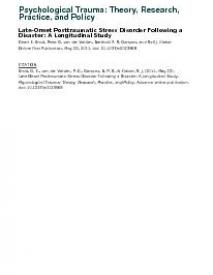Late-onset posttraumatic stress disorder following a disaster: A longitudinal study.
In disaster survivors, the occurrence of mental health problems beyond the immediate aftermath of the disaster has repeatedly been reported. The aim of the present study was to evaluate the course of symptoms and mental health services (MHS) utilization in late-onset posttraumatic stress disorder (PTSD) four years following a disaster and to examine whether late-onset PTSD can be explained within a longitudinal framework of PTSD. Residents affected by a fireworks disaster (N = 1083) participated in surveys 2–3 weeks (T1), 18 months (T2), and almost 4 years (T3) following the disaster. PTSD was assessed at T2 and T3. Participants endorsing disaster-related late-onset PTSD (PTSD at T3 only) were compared to participants endorsing persistent PTSD (at both T2 and T3), recovered PTSD (at T2 only), and no PTSD using latent growth modeling and multinomial logistic regression. Participants endorsing late-onset PTSD comprised 4% of the total sample. They reported high initial intrusion and avoidance and experienced progression of avoidance/numbing and hyperarousal symptoms. They were more likely than all other participants to use MHS at T3. Late-onset PTSD was associated with high education level, severe disaster exposure, number of reported stressful life events, and perceived lack of social support. These results suggest that individuals with late-onset PTSD are likely to endorse prodromal distress, but experience clinically relevant symptom progression leading to increased MHS utilization. Stressful life events and perceived lack of social support may contribute to PTSD symptom progression. Foreseeable stressors in the aftermath of a disaster may be a target for secondary prevention of late-onset PTSD. (PsycINFO Database Record (c) 2012 APA, all rights reserved)
Geachte bezoeker,
De informatie die u nu opvraagt, kan door psychotraumanet niet aan u worden getoond. Dit kan verschillende redenen hebben,
waarvan (bescherming van het) auteursrecht de meeste voorkomende is. Wanneer het mogelijk is om u door te verwijzen naar de bron
van deze informatie, dan ziet u hier onder een link naar die plek.
Als er geen link staat, kunt u contact opnemen met de bibliotheek,
die u verder op weg kan helpen.
Met vriendelijke groet,
Het psychotraumanet-team.
Reference:
G.E. Smid, P.G. van der Velden, B.P.R. Gersons, & R.J. Kleber | 2012
In: Psychological trauma : theory, research, practice, and policy, ISSN 1942-969X | 4 | 3 | mei | 312-322
http://psycnet.apa.org/psycinfo/2011-10476-001/
In: Psychological trauma : theory, research, practice, and policy, ISSN 1942-969X | 4 | 3 | mei | 312-322
http://psycnet.apa.org/psycinfo/2011-10476-001/


